The Partnership to End Homelessness (The Partnership) is pleased to announce $310,000 in grants awarded to 7 organizations leading advocacy and organizing efforts focused on DC. Selected nonprofits will receive up to $50,000 in funding to support work to end homelessness and increase the supply of deeply affordable housing for DC residents.
The Partnership prioritized efforts developed and led by people with lived experience and people most directly impacted, and collaborative efforts that coordinate strategies and messaging across organizations and issue areas. These grants were made possible thanks to generous partners and donors to the Grantmaking Fund.
Learn more about how our partners are working to end homelessness and advancing housing justice.
Ending Chronic Homelessness
Currently, there are 2,761 individuals in DC who have experienced homelessness for over a year and are living with severe health issues. Miriam’s Kitchen received $50,000 to advocate for resources and policies to address these pressing issues. The grant will support the organization’s budget and policy advocacy, and work through The Way Home Campaign. We know that housing is healthcare and that housing saves lives – and are proud to support their housing justice efforts. Learn more and join their advocacy efforts.
“As an organization working to end chronic homelessness, we are grateful for the Partnership to End Homelessness’ support of our advocacy work. The causes of homelessness are systemic and so too must be the solutions. This support will help us to challenge the systems that have created DC’s homelessness crisis, dismantle barriers to exiting homelessness, secure life-saving housing resources, and ensure that those closest to the issue are at the forefront of our advocacy work.” -Lara Pukatch, Director of Advocacy
Centering People Directly Impacted
Fair Budget Coalition (FBC) brings together advocates, service providers, and people directly affected by poverty and housing instability to advocate for budget and public policy initiatives that address poverty and human needs in DC. FBC received a $50,000 grant to support budget advocacy and organizing around homelessness, deeply affordable housing, and permanent supportive housing (PSH) in DC. We’re proud to support FBC as they fight for a fairer budget that is restorative and prioritizes racial justice. Learn more about their current budget advocacy here.
“As advocacy has transitioned to digital spaces, it is clear that the barriers to constituent engagement have increased. Through support from the Partnership to End Homelessness, we will be able to democratize access to budget information and budget spaces through our virtual popular education series, constituent stipends, and technology/tech support for constituents hoping to engage in budget advocacy. This is critical in ensuring that the people most directly impacted by housing policy are centered in the decision-making regarding funding and the future of housing in DC. " -Stephanie Sneed, Executive Director
Advocacy and Organizing Grantees
DC Action
DC Jobs with Justice
District Of Columbia Grassroots Empowerment Project Incorporated – Empower DC
Fair Budget Coalition
Miriam's Kitchen
ONE DC: Organizing Neighborhood Equity
The Washington Legal Clinic For The Homeless Inc
About the Partnership to End Homelessness
The Partnership to End Homelessness in DC, led by the Greater Washington Community Foundation, is the first-of-its-kind initiative in the District to bring together the public and private sectors to ensure homelessness is rare, brief, and non-recurring. By joining together, we can increase the supply of deeply affordable housing, bolster our response system to help more people obtain and maintain stable housing, and ultimately end homelessness in DC.

























